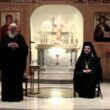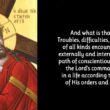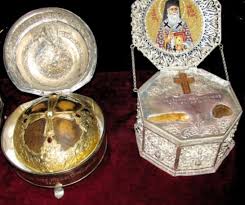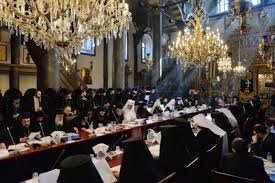We believe that the body of the man who enters the Church becomes a vessel of the uncreated divine energy, bearer of Christ and bearer of holy spirit: ”Do you not know that your bodies are members of Christ himself?…Do you not know that your bodies are temples of the Holy Spirit who is in you, whom you have received from God? You are not your own. Therefore glorify God in your body and in your spirit which are God’s.” (I Corinthians 6, 15-20) ”May God himself, the God of peace sanctify you through and through. May your whole spirit, soul and body be kept blameless till the coming of our Lord Jesus Christ. The One who calls you is faithful and He will do it.” (I Thessalonians 5, 23-24)
Human body is raised in the Church and has an eternal purpose. Meaning that Christ will transform, will change our humble body so that it will become like the body of His glory in order to receive the same shape with Christ’s glorified body. And this will happen at His Second Coming ”by the power that enables Him to subject all things unto Himself.” (Philip 3, 21)
The veneration of the holy relics represents the prefiguration of this new and glorious body state. The honor that is given to them in the Orthodox Church means as well the testimony of our faith in the synodial glory of man (I Thessalonians 5, 23-24)
The sanctifying grace manifests in the holy relics by the fragrance mentioned in the Holy Scripture ( II Corinthians 2, 15, Isaiah 66, 14) and accomplishes miracles (IV Kings 13, 20-21) The same grace is transmitted to the objects that come in contact with the bodies of the saints, these accomplishing miracles as well (IV Kings 2, 8-14) Matthew 9, 20-22, Marcus 6, 13, the Act 19, 12).Because we descend from Adam, we are not in harmony with God’s creation (Genesis 3, 17-19) but the man of God’s grace spreads peace and blessing even by his shadow (Acts 5, 15-16).
Thus, God himself honors the saints’relics and permeates them with His divine uncreated grace.
That is why the Orthodox Church honors them and places them under the holy altar (Hebr. 13,10) prefiguring by this the heavenly altar not made by hands (Apocalypse 6,9) for our altars are symbols of the true ones, namely of the heavenly altar (Hebr.9, 24)
The early church honored the holy relics. Saint Polycarp’s martyrdom (+156) tells us that they were considered ”more valuable than the most precious stones and finer than the most refined gold” (Polycarp’s martyrdom, 18). Christians gathered at martyrs’tombs for celebrating the Divine Eucharist and the commemoration of saints.
These were transmitted to the following generations and there is no information to tell us that the veneration of the holy relics would not be accepted in assembly.
Saint Gregory the Theologian (329-390) mentions the numerous wonders accomplished by the holy relics of Saint Cyprian ”when there is faith”. And adds that ”this is known by all those who experienced it and transmitted it to us and we will transmit it to the next generations” (The Word 24,18 at St.Cyprian)
In the first accusatory word against Julian, st.Gregory says about the saints:
”These deserve great honors and celebrations. They chase away demons and heal diseases…Their bodies alone have the same power with that of their souls, if touched or just honored. Their drops of blood and the small objects of their martyrdoms act just like their bodies.” (St. Gregory the Theologian, Word 4,69) St. John Chrysostom says that ”even the emperor clothed in purple hastes to worship the saints’tombs and prays to them so that they would intercede for him before God.” (St.John Chrysostom, Comment at II Corinthians, Word 26,5).
The same saint expressing the faith of the Church urges: ”visit the resting places of the martyrs where you will find healing for body and avail for soul.” (Comment at Matthew, Word 37,7) In another homily he urges the Christians to go to churches and to the reliquaries of the saint martyrs so that after receiving their blessing to become invincible againts the devil’s wiles (Genesis, homily 15, 6) ”The bones of the saints subdue and torment the demons and free those who were tied with those painful ties.” (Comment at II Corinthians, Word 26,5)
According to the faith of the early church, divine grace is transmitted to anyone who gets in contact with the saints. Even the clothes of the saints are honored in all creation st.John Chrysostom says and recalls st. Elijah’s sheepskin coat (IV Kings 2, 8-14), the clothes of the three young men who overcame the fire (Daniel 3, 27-28) , the rod of Moses that accomplished so many miracles, st.Paul’s clothes (Acts 19, 11-12), st.Peter’s shadow (Acts 5, 12-16) and others (St.John Chrysostom, At statues, homily 8,2)
St. Basil tells us that the veneration of st.Judith’s relics sanctifies the city and all those who enter the church.
The earth that by the burial of the saint received blessings springs holy water which is for the healthy ones guarding and bearing myrth and for the sick ones is solace (St. Basil the Great, homily 2 about St.martyr Judith, 2)
In the Orthodox Church we honor the holy relics but this as we have proved it does not mean idolatry or pagan adoration. Because an Orthodox Christian has never considered the holy relics ”as gods.”
Priest Anthony Alevizopoulos, Textbook of heretical and sectarian groups, Athens 1994









